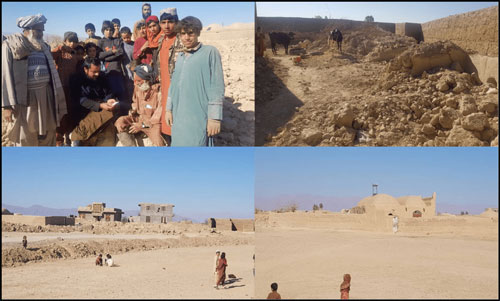The war-affected residents of Dehk village of western Farah province have returned to their ruined homes and are trying to rebuild them amid hopes for peace.
Dehk is located five kilometers northeast of Farah City, the provincial capital. The Kanda-har-Herat highway passes through this village.
A gate to the provincial capi-tal, the village was the scene of fierce fighting four months ago. Everything here seems to have been ruined.
Every house of the village has signs of war that can be seen from a distance. Particularly, conflict-destroyed houses, bombed-out orchards and col-lapsed walls of gardens draw everyone’s attention.
But now that the war has stopped, some have begun rebuilding their homes while others are just watching their ruined abodes. They are un-able to reconstruct their shel-ters.
More than 80 houses in the village have been destroyed by fighting. The mosque alone seems to be undamaged. In its courtyard, children are playing with abandon and eld-ers call it the only place of worship.
Located around a security checkpoint, these houses were destroyed in a matter of three days about seven months ago by forces of the previous government, say residents of the area.
Obaidullah, a resident of the village, while irrigating his land, switched on his radio and listened to the news.
Despite financial woes, he looks hopeful about the future. The 24-year-old is glad that the war has ended and peace is coming back to the area.
“At the moment, there is no war. There is peace and sta-bility. In the past, we could not cultivate our fields as security forces opened fire at us,” he added.
Obaidullah recalled the trag-edy of his uncle’s family. “As their house was shelled, my uncle and aunt were killed and their two children wounded.”
Obaidullah, whose house was destroyed in the fighting, was forced to move along with his family to Farah City. He re-cently rebuilt two rooms in his house in the village.
The man said although eco-nomic hardships had made life miserable for him, he had returned to his native village and irrigated his crops without any fear.
Obaidullah is not the only one telling the woeful tale of this village. Noor Mohammad, an-other resident, has a similar story.
Reconstructing his home, Mohammad recalled: “There were two houses at this site — mine and my son’s. But both were destroyed during the war.”
However, vehicles’ movement in the war-hit village has re-vived hopes that Dehk will be rebuilt.Mohammad looks happy with the current situation, saying villagers were busy rebuilding their houses and lives. The vil-lage was slowly regaining its lost beauty, he noted.
He said: “The villagers have come back. Obaidullah has resumed farming. It’s a bless-ing of peace.”
Eighty-year-old Mohammad Nader and Mohammad Afzal, sharing the bitter tales of con-flict, are happy that the fear of war has vanished.They say their problems are that they could not afford to rebuild their houses.
This in-ability had made life difficult for them.
Living in another part of the village, Nader has now built several rooms in the area. He says: “We don’t care about hunger and thirst. Allah is merciful. Peace has returned.
“I tell everyone not to fight any longer, for God’s sake, be-cause our countrymen can no longer afford to fight,” he con-tinued.Residents of Dehk praised Obaidullah’s work – rebuilding his house and farming.
They want all young people to work hard to rebuild their homes. They want the government and donor agencies to help them rebuild their lives after decades of war.










